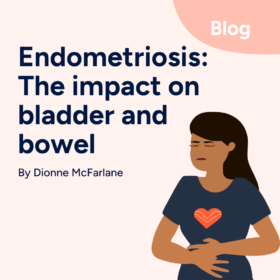March is Endometriosis Awareness Month. I have decided to write this month’s blog about how the condition can impact on the bladder and bowel. This can be difficult for some people to talk about but by having these conversations it might mean that someone else will feel less alone.
I had been struggling with bladder and bowel issues since I was a teenager, and doctors were unsure what the cause was. I remember being told by one doctor it was IBS (Irritable Bowel Syndrome) and I was given buscopan to take. I started finding it really painful to go to the toilet. The way I would describe it is that it was like razor blades, and I would dread each time I had to go. I had to stop eating certain foods due to them causing severe pain and having to rush to the toilet. I would be in there for around 45 minutes in agony and the pain would cause me to vomit. When symptoms were at their worst, I would have to wear a pad just in case of any accidents as I was worried, I would not make it to the toilet on time. It was not until 2016 when I had a diagnostic laparoscopy that it was confirmed I had endometriosis and that it was on my bowel, but it would need to be assessed and I would require a further surgery.
I also had issues with my bladder due to endometriosis and since I was about 13 or 14 years old, I struggled with recurrent urinary tract infections (UTIs). This was very debilitating as I would become quite unwell with these infections which would mean I would be left bedbound and vomiting. The GP had to prescribe antibiotics to treat the infections but every few weeks they kept coming back and starting up again. I started having issues with blood in my urine and I remember at one point going to the toilet and it was just pure red, and I panicked not knowing what was wrong. My GP tried to provide reassurance and sent me to A&E to be seen and get input from them.
It was a few years later that I remember being unable to empty the urine from my bladder. This was just at the start of COVID in 2020 and I had 700ml of urine in my bladder, so I ended up with a catheter in for a few weeks to give my bladder a bit of a break, but this happened again a few months later and I was referred to Urogynaecology for review. I was taught how to do intermittent self-catheterisation (ISC) by a lovely nurse specialist in a clinic. The nurse was brilliant and made me feel at ease throughout the appointment I felt very well supported. I have been doing ISC for almost 4 years now and just having that reassurance that I am emptying my bladder helps. I still struggle with UTIs, but I am currently trying to find ways of managing this.
My advice to anyone who is experiencing these issues is please speak to your GP. I totally understand that it might feel awkward or embarrassing but doctors are used to talking about these topics and might be able to suggest ways to help. I found it helpful through my journey to keep a diary of symptoms so that I could show the doctor, and it also gave them a bit more information.
When dealing with these symptoms support is really important. It can help meeting others who are experiencing the same or similar issues. It can help you to feel less alone. If you feel you can, reach out to friends or family but if this is difficult there is also the option of support groups available. This provides a safe space for you to talk about these issues openly and to others that can understand.
If, like me, you’re based in Scotland you can find a list of endometriosis support groups on The University of Edinburgh website. Endometriosis UK also lists support groups in Scotland as well as the rest of the UK.
If you need someone to talk to, I am only a message away! You can find me on Instagram at @endowarrior_x
Sending love,
Dionne x
